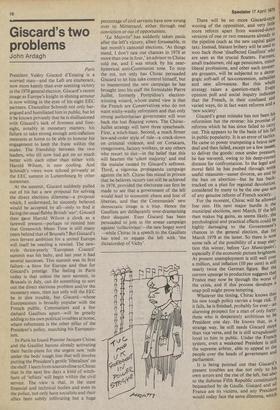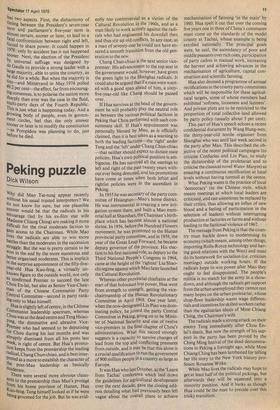Giscard's two problems
John Ardagh
Paris President Valery Giscard d'Estaing is a worried man—and the Left are exuberant, now more keenly than ever scenting victory in the 1978 general election. Giscard's recent image as Europe's knight in shining armour is now wilting in the eyes of his eight EEC partners. Chancellor Schmidt not only harangued and humiliated him in public, but let it be known privately that he is disillusioned with Giscard's lack of firmness and foresight, notably in monetary matters: his failure to take strong enough anti-intlation measures at home to be able to honour his engagement to keep the franc within the snake. The friendship between the two leaders, who till now had got on so much better with each other than either with Harold Wilson, is now cooling. And Schmidt's views were echoed privately at the EEC summit in Luxembourg by other statesmen.
At the summit, Giscard suddenly pulled out of his hat a new proposal for solving the direct elections dilemma—a proposal which, I understand, he sincerely believed would be accepted by all—only to find it facing the usual flabby British 'niet'. Giscard then gave Harold Wilson a clock as a farewell present—perhaps to remind him that Greenwich Mean Time is still many years behind that of Brussels? But Giscard's own fervent ambition for a united Europe will itself be needing a rewind. The newstyle thrice-yearly 'European Council' summit was his baby, and last year it had several successes. This summit was its first failure—a blow for Europe and thus for Giscard's prestige. The feeling in Paris today is that unless the next summit, in Brussels in July, can do something to sort out the direct elections problem and/or the monetary mess, then not only will the EEC be in dire trouble, but Giscard—whose Eurdpeanism is broadly popular with the French public, Communists and a few diehard Gaullists apart—will be greatly adding to his own political troubles at home, where reformism is the other pillar of the President's policy, matching his Europeanism.
In Paris he found Premier Jacques Chirac and the Gaullist barons already activating their battle-plans for the urgent new 'reds under the beds' tough line that will involve putting the President's gentle 'liberalism' on the shelf. I learn from sources close to Chirac that in the next few days a kind of witchhunt of 'leftists' will begin within the civil service. The view is that, in the state financial and technical bodies and even in , the police, not only have socialists and their allies been subtly infiltrating but a huge
percentage of civil servants have now swung over to Mitterrand, either through real conviction or out of opportunism.
`La Majorite' has suddenly taken panic after the left's victory, albeit foreseeable, in last month's cantonal elections. 'As things stand, I don't rate our chances in 1978 at more than one in four,' an advisor to Chirac told me, and I was struck by his nearhysterical anti-Communist tone. To stop the rot, not only has Chirac persuaded Giscard to let him take control himself, but to mastermind the new campaign he has brought into his staff the formidable Pierre Juillet, formerly Pompidou's electionwinning wizard, whose stated view is that the French are Conservatives who do not want wishy-washy reformism and that only strong authoritarian government will woo back the lost floating voters. The ChiracJuillet strategy will have three spearheads. First, a witch-hunt. Second, a much firmer law-and-order style of rule—a crack-down on criminal violence, and on Corsicans, vinegrowers, factory workers, or any others who resort to riot—in the belief that this will hearten the 'silent majority' and end the malaise caused by Giscard's softness. Third, a vigorous propaganda campaign against the left. Chirac has stated in private that he believes victory can still be achieved in 1978, provided the electorate can first be made to see that a government of the left would lead to economic chaos and loss df liberties, and that the Communists' new democratic image is a trap. Hence the Gaullists are deliberately over-dramatising their disquiet. Even Giscard has been persuaded to join in the smear campaign against 'collectivism'—the new bogey word —while Chirac in a speech to the Gaullists has tried to equate the left with 'the dictatorship of Vichy'.
There will be no more Giscard-style wooing of the opposition, and very little more reform apart from watered-down versions of one or two measures alreadY the pipeline (such as the new capital gains tax). Instead, blatant bribery will be used to woo back those 'disaffected Gaullists' who are seen as the crucial floaters. Farmers, small tradesmen, old age pensioners, minor liberal professions, and other such inveterate grousers, will be subjected to a demagogic soft-sell of tax-concession, subsidies and new allowances. But this whole strategy raises a question-mark. Eveg opinion poll and social inquiry indicates that the French, in their confused and varied ways, do in fact want reforms and a 'new society'. Giscard's great mistake has not been his reformism but the reverse: his promise of reforms which he has since failed to carry out. This appears to be the basis of his fall in public popularity. It is an error of tactics. He came to power trumpeting a brave new deal and then failed, except on a few issuer> to deliver the goods: once under pressures he has wavered, owing to his deep-rooted distaste for confrontation. In the legal and moral field he has pushed through some useful measures—easier divorce, an end to the ban on abortion—but he has backtracked on a plan for regional devolution' considered by many to be the sine qua non of any genuine reform of French society. For the moment, Chirac will be allowed free rein. His next major hurdle is the municipal elections, next March. If the left then makes big gains, as seems likely, the psychological and practical effects could be highly damaging to the Government's chances in the general election, due for March 1978 at the latest. So there is novi some talk of the possibility of a snap election this winter, before 'Les Municipales', especially if the economic picture brightens. At present unemployment is still well over a million, and inflation (10 per cent) is still nearly twice the German figure. But the current upsurge in production suggests that France may now be through the worst of the crisis, and if this' process develops a snap poll might prove tempting.
Whatever the timing, Chirac knows that his new tough policy carries a huge risk. ff it fails, he is finished, probably for ever—a° alarming prospect for a man of only fortYthree who is desperately ambitious to be President one day. He knows that, in a strange way, he still needs Giscard more than vice versa, and he is still scrupulouslY loyal to him in public. Under the French system, even a weakened President is still the supreme arbiter, able to appeal to the people over the heads of government and parliament.
It is being pointed out that Giscard's present troubles are due not only to his own errors and the rise of the left, but also to the dubious Fifth Republic constitutioil bequeathed by de Gaulle. Giscard and all France are its victims, and any President would today face the same dilemma, which has two aspects. First, the disharmony of timing between the President's seven-year term and parliament's five-year term is almost certain, sooner or later, to lead to a fatal confrontation between right and left, forced to share power. It could happen in 1978: only by accident has it not happened sooner. Next, the election of the President by universal suffrage was designed by IC Gaulle to provide a strong leader with a large majority, able to unite the country, as be did for a while. But when the majority is tinY—and Mitterrand in May 1974 polled 49.2 per cent—the effect, far from encouraging consensus, is to polarise the nation more Sharply than ever was the case in the fluid, multi-party days of the Fourth Republic. This is just what is happening today. And a growing body of people, even in government circles, feel that the only answer sooner or later is to modify the constitution —as Pompidou was planning to do, just before he died.



































 Previous page
Previous page